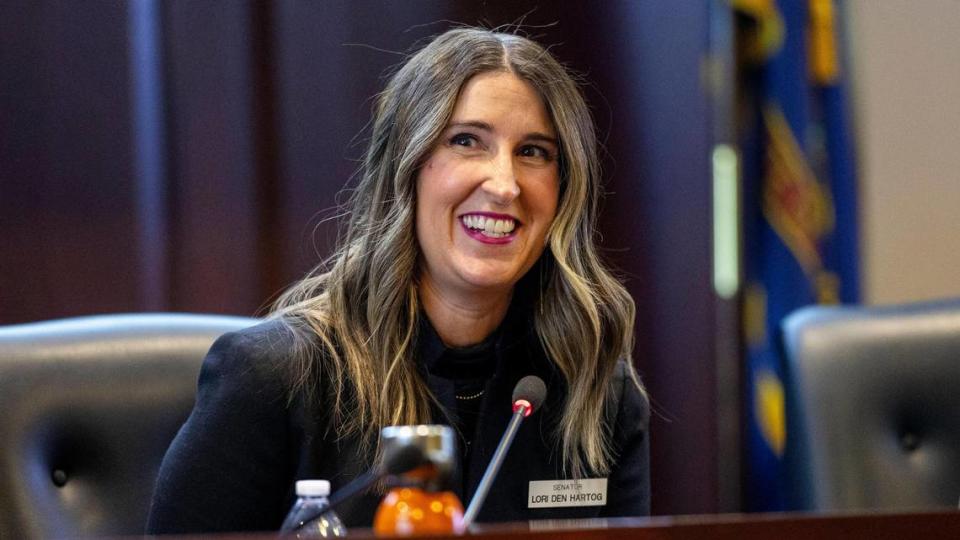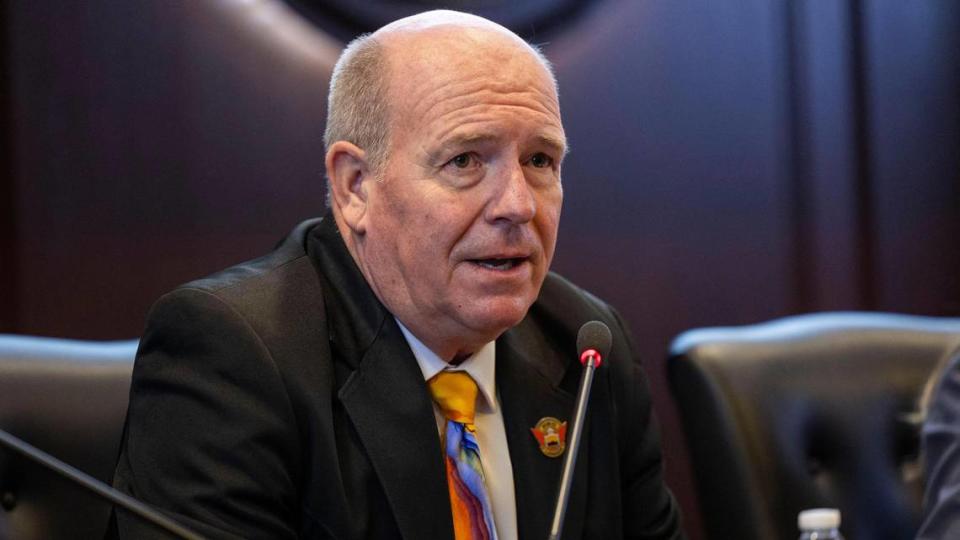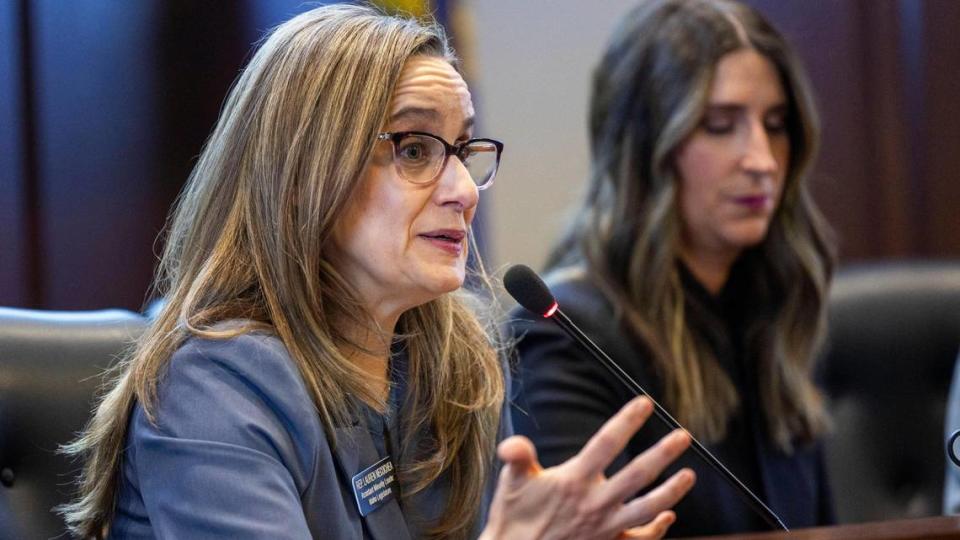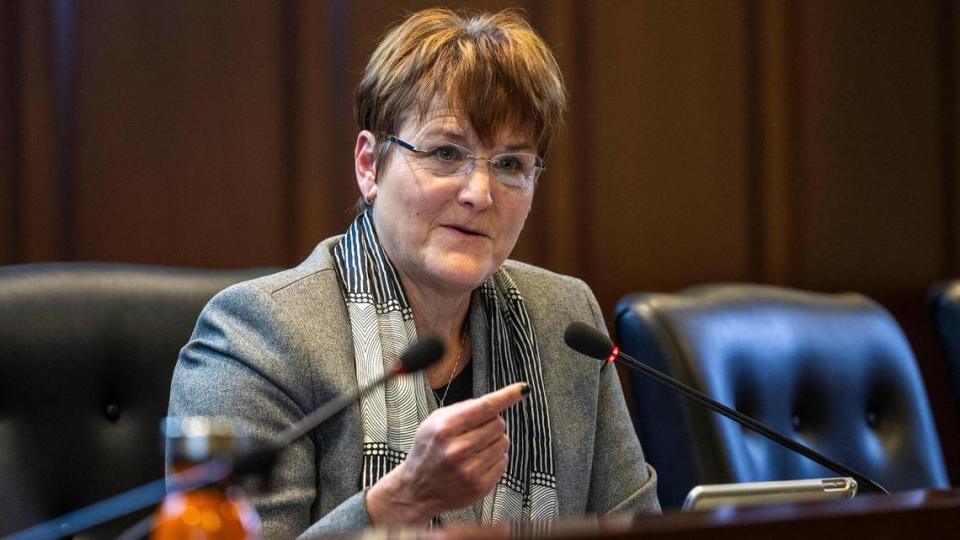Idaho Republicans expect more proposals on school funding, tax cuts. Four issues to watch
- Oops!Something went wrong.Please try again later.
- Oops!Something went wrong.Please try again later.
- Oops!Something went wrong.Please try again later.
School maintenance funding. Abortion laws. Workforce training grants. Tax relief. Library materials.
The list of issues that will likely be heard during this year’s legislative session is long, with some controversial proposals that failed last year likely to get another shot at becoming law in the next few months.
Gov. Brad Little continues to emphasize education, after Little implemented a 16.4% increase in school funding last year. The state set aside $410 million in sales tax revenue for education in 2022.
“My top priority from the get-go — and it will continue to be — has been education,” Little told reporters Thursday at a preview hosted by the Idaho Press Club. Little likely will unveil another big education funding proposal in Monday’s State of the State address.
At the same time, some Republican lawmakers are pushing for changes that would alter the landscape of public education.
Last year’s bid to implement education savings accounts for students whose parents home-school them or send them to private school — which failed — will return in some form.
Education savings accounts are commonly known as school vouchers and would allow students who don’t attend public schools to use state education dollars to pay for their expenses. Opponents worry that such a proposal would inevitably divert money away from public schools. Ninety percent of Idaho youths attend public schools, said Sen. Melissa Wintrow, R-Boise. Idaho has consistently ranked among the bottom in spending per student and last in school infrastructure funding, according to national and state reports.
Sens. Lori Den Hartog, R-Meridian, and Scott Grow, R-Eagle, alongside Rep. Wendy Horman, R-Idaho Falls, announced a “parental choice tax credit program” on Thursday. The state lawmakers in the news release said it would help parents cover qualifying expenses, including private school tuition.
“One of the things I’m looking forward to working on is expanding more parental choice options in education,” Den Hartog told reporters at a legislative preview Thursday.

Little also touted his workforce training grant program known as Idaho Launch on Thursday, which provides $8,500 for graduating high school seniors embarking on careers highly in demand. More than 12,500 have applied so far, according to the governor’s office, which is more applicants than will be able to receive funding.
But the program passed by a single vote in the House, with most GOP members opposing it, and in recent months it has been the subject of feuds between some legislators and their local Republican party branches.
Den Hartog said Thursday that she was disappointed in the analysis the state conducted to determine the most in-demand careers. The most in-demand career, as determined by the Idaho Workforce Development Council, was for “office clerks.” She said she was concerned students could receive the grants to work in general office jobs, when there’s a higher need for trained workers in specific trade industries.
”I don’t think that’s what the intent of the program is,” Den Hartog said.
But the highest number of applicants for the program so far have been in more technical job categories, such as health care technicians, nursing and engineering, according to data from the council.
Den Hartog said she expects to see proposals this session “tweaking the program.”
“Government handouts generally don’t work so well, and this is a big government handout,” House Speaker Mike Moyle, R-Star, said Thursday. He said some applicants won’t be invested in the education their grants allow because it does not come at a price.
“Generally when we start these programs, they don’t turn out the way we think they will,” Moyle said.

Little said the program and other new funding are about investing in the state’s future.
“We want Idaho to be a place where our children choose to stay,” he said.
School building repairs
Disagreement among lawmakers about public school funding comes as many schools in Idaho face severe backlogs to repair or replace school buildings. Districts struggle to find the money for infrastructure in part because Idaho is one of two states that require two-thirds of voters to support school bonds, according to previous Idaho Statesman and ProPublica reporting.
Nearly four in five Idaho superintendents surveyed by the Statesman and ProPublica said they have five or more building issues that pose a significant challenge.
“We hope we can finally address the billion-dollar backlog in school facilities needs so that children aren’t contending with overcrowded classrooms, leaky roofs or serious safety issues while they’re trying to learn,” Rep. Lauren Necochea, D-Boise, said Thursday.

Some lawmakers are exploring the potential for changing that two-thirds bond threshold. Others are still opposed.
“I don’t support lowering it at all,” Moyle said. But he said he expects to see expanded funding for public school facilities.
Den Hartog said she thinks it’s important that bond measures that involve decades’ worth of taxes have strong voter support. But she added that she is open to changing the threshold depending on voter turnout.
Abortion
Since the overturning of Roe v. Wade, Idaho has almost entirely outlawed abortion through a set of laws that ban the procedure in all cases except when a pregnancy would cause a patient’s death or when a pregnancy was the result of rape or incest that has been reported to law enforcement.
Abortion rights advocates have warned that the laws threaten women’s health and equal rights and have sued the state. Some of those lawsuits are still working their way through court.
The state also shut down a maternal mortality committee last year, making Idaho the only state without such a working group, while the mortality rate for mothers rose 121.5% from 2019 to 2021, according to a report from Idaho Kids Covered, a health care advocacy group.
“There’s some discussions there on ... what we can do to help our families and our women that have crises,” Moyle told reporters Thursday.
Libraries
Den Hartog also said told reporters she expects to see more “library bills.”
Lawmakers last year passed a bill last year that would have allowed residents to collect $2,500 in damages for every time a minor obtained what Republican lawmakers believed was “harmful” material from a library. Little vetoed it.
“This legislation makes sweeping, blanket assumptions on materials that could be determined as ‘harmful to minors’ in a local library, and it will force one interpretation of that phrase onto all the patrons of the library,” Little wrote in his veto letter.
When the House tried to override the veto with another floor vote, needing two-thirds of support, the bill failed by one vote.
Tax relief
Lawmakers last year passed a bill that provided an estimated $314 million in property tax relief and saved homeowners an average of 18% on their bills, according to the governor’s office. The move followed three prior years when lawmakers used large influxes of federal COVID-19 relief dollars to issue tax rebates to residents and consolidate income tax brackets to a flat tax rate, while also touting large budget surpluses.
This year, the House plans to do something similar.
“You will see tax relief, at least on the House side,” Moyle said, noting that he expects more income tax reform.
Moyle also voiced his concerns about Medicaid and said the state needs to rein in costs that he said “keep going up.”
The number of low-income Idahoans covered with Medicaid health insurance increased in 2020 following a popular voter initiative. Though the state would have to pay more for health services without the influx in federal funding that accompanies Medicaid expansion, many Republican lawmakers are still upset about the program’s costs.
Sen. Melissa Wintrow, D-Boise, countered that the Medicaid budget has stabilized in the past five years and that it saves the state money on health care costs.
Democrats in the Legislature, which is dominated by a Republican supermajority, have also argued that the state’s surpluses are not actually surpluses.
“In the last five years, we’ve given back over $2 billion in permanent and temporary income tax rebates that we could have used some of that to invest in the things that we’re talking about today,” Wintrow said. “That’s why I think it’s so important ... to make sure that we are taking care of what we have to take care of before we start returning revenue.”


